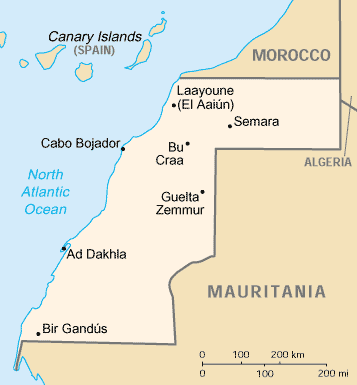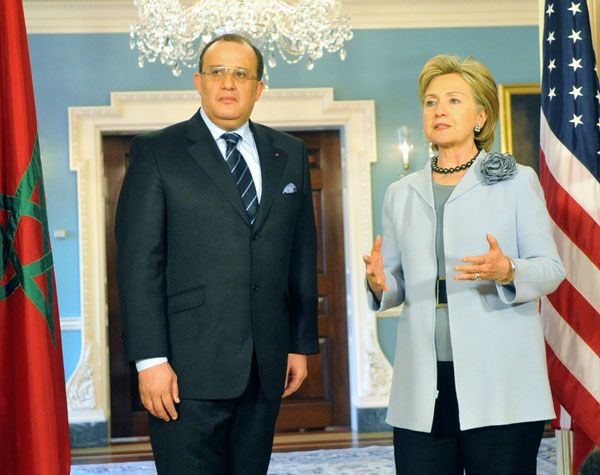Being US Secretary of State requires difficult choices and careful words. There is a balance to be struck between maintaining relations but also principle. Great harm can be done with a few words. One recent episode illustrates the risks.
In my work on the Western Sahara (my non-profit group advises the
Polisario Front who represent the Saharawi people), I have met a very
brave and determined woman, Aminatou Haidar, the 42-year old Saharawi human rights campaigner. What she told me about her abuse by the Moroccan forces who occupy the Western Sahara, her country, chilled my blood.

I was shocked to learn that last week Aminatou was again arrested and later expelled by Morocco.
(Find information in Norwegian here).
She has endured years of imprisonment and abuse
but has continued to speak up for the right of her people to
self-determination. Last month she was in the US to receive the Civil Courage Award from the Train Foundation, and she was earlier awarded the Robert F. Kennedy Human Rights Award. She was arrested on her return from the US and is now separated from her children and exiled from her country.
Clinton praised Morocco
The week before Haidar’s arrest, Hillary Clinton visited Morocco. While there, she gave an interview, unreported here in the US, praising Morocco’s human rights record and appearing to endorse the Bush administration’s policy to support Morocco’s plan for the Western Sahara.
Morocco has been in illegal occupation of the Western Sahara since invading it in 1975. If implemented, Morocco’s plan would effectively bring Western Sahara under Moroccan sovereignty, a notion rejected outright by the International Court of Justice and never accepted by the US.
Ask Aminatou Haidar about Morocco’s occupation and she will tell you that it means continued repression and abuse of the Saharawi people, most of whom were forcibly expelled from the territory in 1975 and have remained in desert refugee camps ever since. This is not just  Aminatou’s view. Amnesty International, Human Rights Watch, and even the State Department itself have detailed Morocco’s systematic abuse and denial of rights to the Saharawi people.
Aminatou’s view. Amnesty International, Human Rights Watch, and even the State Department itself have detailed Morocco’s systematic abuse and denial of rights to the Saharawi people.
Indulgence for repression
After Secretary Clinton’s interview, Morocco has gone on the offensive
against the Saharawis. Morocco’s arrest and expulsion of Haidar, who is the Saharawis’ most prominent and celebrated activist, is clearly meant to intimidate and silence all Saharawis. In addition to her arrest, Morocco has decided to try for treason seven other Saharawi human rights activists. Facing a military court, these six men and one woman now face the death penalty for their "crime" of visiting their compatriots in the refugee camps and demanding their legal right of self-determination.
No doubt that Hillary Clinton would not endorse this flagrant abuse
of human rights, on the contrary. The trouble is that it is equally clear
that Morocco has taken her words as an implicit permission to enact this repression, even if she in no ways intended it so. Morocco maneuvers with great skill, and it has clearly sensed a political opportunity to close down Saharawi demands for self-determination once and for all. After the Secretary of State’s visit, the King of Morocco gave a speech unprecedented in its hostility against the Saharawis, accusing them of treachery.
 So the US must now respond. It must demand the release of these brave campaigners for their rights. Moreover, the US must address the root cause of Morocco’s abuses — its occupation of someone else’s country, the Western Sahara. The UN envoy is a thoughtful and experienced US diplomat, Christopher Ross. He can only resolve the long-standing dispute over the Western Sahara with robust support from his own government in Washington. This means pressure, at last, on Morocco, to allow a meaningful process of self-determination.
So the US must now respond. It must demand the release of these brave campaigners for their rights. Moreover, the US must address the root cause of Morocco’s abuses — its occupation of someone else’s country, the Western Sahara. The UN envoy is a thoughtful and experienced US diplomat, Christopher Ross. He can only resolve the long-standing dispute over the Western Sahara with robust support from his own government in Washington. This means pressure, at last, on Morocco, to allow a meaningful process of self-determination.
If this is done, it may be that a misinterpreted interview may trigger –
at last – the long overdue liberation of an oppressed people. Aminatou Haidar would consider her arrest and long years of suffering a price well worth paying for this result.
Find the original story here.
Carne Ross is a former diplomat. The non-profit advisory group he heads, Independent Diplomat, amongst others advises the Polisario Front, the representatives of the Saharawi people.
***
Express your support
Front Line is extremely concerned to learn that human rights defender Ms Aminatou Haidar has been expelled from Western Sahara and deported to the Canary Islands following her arbitrary arrest on 13 November 2009 at Laayoune airport. Moroccan authorities held her for nearly 22 hours before sending her to Spain. Aminatou Haidar is the chairwoman of CODESA (Collective of Sahrawi Human Rights Defenders).![]()
Your action on behalf of human rights defenders at risk can make a real difference. Take action, visit Front Line‘s page.





